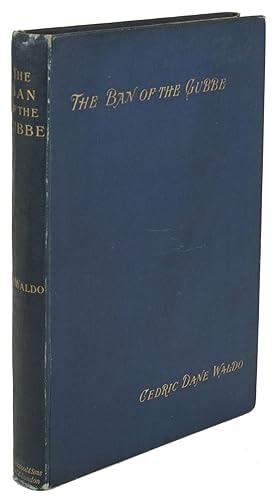WALDO, CEDRIC DANE PSEUDONYM OF CECIL DRUMMOND WOLFF (1 résultats)
Type d'article
- Tous les types d'articles
- Livres (1)
- Magazines & Périodiques
- Bandes dessinées
- Partitions de musique
- Art, Affiches et Gravures
- Photographies
- Cartes
-
Manuscrits &
Papiers anciens
Etat
- Tous
- Neuf
- Ancien ou d'occasion
Reliure
- Toutes
- Couverture rigide
- Couverture souple
Particularités
- Edition originale
- Signé
- Jaquette
- Avec images
- Sans impression à la demande
Pays
Evaluation du vendeur
-
THE BAN OF THE GUBBE
Edité par William Blackwood and Sons, Edinburgh and London, 1896
Vendeur : Currey, L.W. Inc. ABAA/ILAB, Elizabethtown, NY, Etats-Unis
Edition originale
Octavo, pp. [1-4] [1] 2-195 [196: printer's imprint], original blue cloth, front and spine panels stamped in gold, top and fore-edges untrimmed, brown coated endpapers. First edition. A tale of the Fiskmänne, a lost race of fish-like people, probably inspired by Scottish folklore telling of the Selkies, legendary seal-people. The story is told partly from the point of view of Jan, a descendant of the Fiskmänne, who has retained vestiges of their physical traits, mainly webbed feet and short fin-like arms; and partly from that of the narrator, who meets Jan and his beautiful-but-sad daughter at a German watering hole. The young pair fall in love and eventually find happiness, but in between we hear the tale of Jan's search for his ancestors, told in a manner that should appeal to antiquarians. He discovers that he descends from a Fiskmänne who long ago betrayed his people after they abandoned him during a battle with humans. Generations of intermarrying with humans have diluted the fish-like traits in Jan and eliminated them in his daughter. He traces the remnant of the fishmen to the barren northeast coast of Scotland, where they live in undersea caves. He eventually gains their trust and spends much of his time with them. But when they ask him to give his daughter in marriage to one of them, he balks and this sets off the tragic denouement. The story is told with more of an elegiac than horrific tone, reminiscent a little of Hudson's GREEN MANSIONS. The most fantastic element of the story involves the Gubbe, the title given to the leader of the fish people, who lives for hundreds of years, can see into the future, has armor-like scales on his body, and never forgets that Jan's ancestor once betrayed them. The "ban" of the title refers to the curse that the Gubbe laid on Jan's ancestor and all his descendants. A little short on suspense, but an unusual story for the period. The story's key action takes place in the ocean littoral, with its rocky formations rising and falling with the tide. The plodding verisimilitude of this part of the narration anticipates Childers' use seven years later of a similar setting in THE RIDDLE OF THE SANDS. These settings manage to combine a sense of mystery with a sense of the mundane. The coastal territory, both a landscape and a seascape and neither one, calls up none of the traditional picturesque associations of either land or ocean, yet is more threatening in an ontological sense, as it has the stability of neither land nor sea. It is a strange shifting world, shallow yet elusive. Locke, A Spectrum of Fantasy, p. 220. Suvin, Victorian Science Fiction in the UK, p. 66. Reginald 14770. Not in Bleiler (1948; 1978). Cloth lightly worn at spine ends and corners, faint cup ring on front cover, small sticker stain on front free endpaper, a very good copy. Scarce. (#171100).


